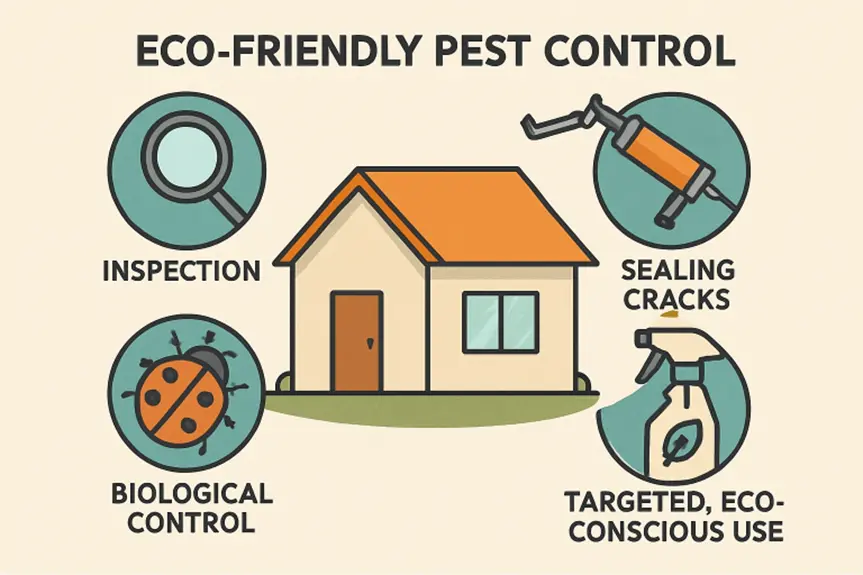Introduction to Pest Prevention
When homeowners and businesses encounter persistent pest problems, many turn to the most familiar solution: chemical sprays. However, true quality in pest control goes far beyond this “spray and pray” mentality. Effective, long-lasting solutions require a comprehensive approach that addresses the root of infestations, balances environmental responsibility, and leverages scientific expertise. For those seeking pest control in Collegeville, understanding what sets modern pest management apart ensures safer and more reliable outcomes.
By looking beyond quick chemical fixes, property owners unlock the full potential of expert pest control strategies—safeguarding families, businesses, and the greater community. Let’s dive into what true quality pest solutions look like, why integrated methods are critical, and how embracing innovation can lead to safer environments for all.
Integrated Pest Management (IPM): A Holistic Approach
Integrated Pest Management, or IPM, is now the gold standard in pest control. This strategy recognizes that pests thrive where conditions are suitable, and that sustainable control comes from disrupting these conditions through proactive, multi-layered tactics:
- Inspection and Monitoring: Regular checks reveal pest activity early and help identify infestation patterns, leading to data-driven decisions rather than reactive treatments.
- Preventive Measures: Simple steps such as sealing cracks, proper waste management, and removing standing water can eliminate routes for pest entry and survival.
- Biological Controls: The introduction of natural predators (such as ladybugs for aphid control) or beneficial microorganisms targets pests without collateral environmental damage.
- Targeted Chemical Use: Pesticides are used strategically and sparingly, only when necessary, to minimize exposure risks to humans, pets, and beneficial species.
By practicing IPM, property managers and homeowners can reduce chemical dependency and achieve longer-lasting, cost-effective pest prevention.
Eco-Friendly Alternatives to Traditional Pesticides
Environmental impact is a growing concern in the pest control industry. The latest wave of eco-friendly products and techniques is designed to be tough on pests but gentle on people, animals, and beneficial insects. Popular sustainable methods include:
- Botanical-Based Pesticides: Essential oil-based sprays from plants like neem or pyrethrum offer effective treatment while breaking down quickly in the environment.
- Microbial Insecticides: Products like Bacillus thuringiensis (Bt) specifically disrupt harmful insect larvae but leave other species unharmed, protecting biodiversity.
- Pheromone Traps: By mimicking insect communication, pheromone traps lure pests for capture, providing control without environmental contamination.
For example, if you’re dealing with pet-related pests, seeking targeted flea control in Collegeville with eco-friendly solutions addresses both the infestation and your family’s safety.
This movement towards sustainability is closely tied to broader public health goals, as excessive pesticide use can contribute to environmental contamination and pest resistance. The Environmental Protection Agency (EPA) encourages such approaches for a safer, healthier ecosystem.
Technological Innovations in Pest Control
Cutting-edge pest management draws heavily on technology to monitor, prevent, and address infestations quickly and with greater precision. Recent advances include:
- Smart Traps and Sensors: These devices instantly notify technicians of pest activity, reducing time to intervention and allowing for more targeted control.
- Automated Pest Detection Systems: Machine learning algorithms process sensor and camera data to predict future outbreaks, enabling pre-emptive action.
- Drone-Assisted Surveys: Aerial surveys of large properties help identify pest hotspots and precisely deliver treatments, reducing chemical drift and waste.
Adopting these innovations means faster, more effective responses and a minimized environmental footprint, advancing the science of pest control and the safety of residents.
Community and Public Health Implications
Pests such as rodents, cockroaches, and mosquitoes do more than cause discomfort—they pose serious threats to public health through the diseases they carry. Responsible, comprehensive pest management solutions help prevent the spread of illnesses like West Nile virus, hantavirus, and food-borne bacteria. This is a critical reason why public agencies and healthcare providers advocate for community-wide pest monitoring and intervention strategies. The Centers for Disease Control and Prevention (CDC) provides guidance on how managing pests can reduce health risks across neighborhoods.
The Role of Professional Expertise
While DIY pest products are widely available, they rarely deliver the results or safety assurances that professional pest control experts provide. Licensed professionals are trained to diagnose, design, and implement solutions specific to each property’s use, vulnerabilities, and pest threats. Their knowledge ensures not only the elimination of current infestations but also proactive prevention, reducing future risks and costs.
Tailoring Solutions to Fit Every Space
No two properties face the same pest risks or environmental pressures. High-quality pest control providers conduct thorough assessments, considering property type, occupancy, local pest trends, and even landscaping factors, then design customized plans. This approach ensures not just pest elimination, but ongoing protection tailored to your unique needs and surroundings.
In conclusion, quality pest solutions require moving beyond quick chemical fixes in favor of holistic, technology-driven, eco-friendly practices, and deep professional expertise. By understanding and investing in these modern approaches, residents and businesses in Collegeville and beyond can ensure a safer, healthier, and pest-free environment for all.
Also Read-Exploring advanced techniques in independent financial trading


